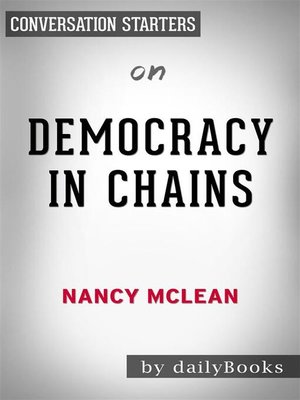

The third area of critique has to do with her handling of her sources. The second is closely related and has to do with her analysis of the political import of Buchanan’s ideas and whether they are really so consonant with or integral to the political projects she links them to. The first is with her characterization of Buchanan-his motives and vision of society and his character.


To me, there are three basic areas where people have had problems with MacLean and her book. I think there are a few basic recurrent lines of attack, and my response can be generalized over each several instance, but if you feel that there are important criticisms that I have not answered or addressed, please link them in a comment and I’ll do my best to respond to them as well. This post, then, is intended simply to answer some of the more prominent lines of attack on MacLean and on the book please watch this space for further discussion of the book itself.īecause of the volume of responses to MacLean and her book, I’m going to proceed synthetically and use representative examples of particular kinds of critiques rather than sort through an itemized list containing each separate charge. But there has yet to be any substantive pushback to the critiques that have been advanced so far, and many of her detractors have taken that silence as proof that their arguments have incontestable merit. Nor is this post intended to stand in for an exposition of the book. Let me be clear: I don’t speak for MacLean. īut there remain quite a number of criticisms which I personally feel are simple misreadings of MacLean’s arguments and method. Some of the other authors of this blog and I are planning a roundtable for later on to discuss Democracy in Chains as a work of intellectual history, in large part because we feel that the critiques of MacLean’s work have not adequately engaged with its core arguments and because these critiques often seem unfamiliar with the “best practices” of intellectual history: there is likely some interdisciplinary miscommunication here.

Most but not all of this negative response has been from scholars who identify as libertarians. Some of this notice has been very positive, but much more has been sharply critical, attacking MacLean’s scholarly credibility. You may be aware that the new book by Nancy MacLean, Democracy in Chains: The Deep History of the Radical Right’s Stealth Plan for America, has received a lot of notice over the past week or two.


 0 kommentar(er)
0 kommentar(er)
